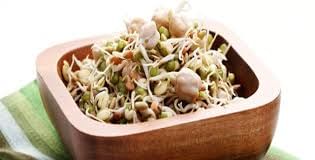Digestive Enzymes- Sprouted seeds, legumes.
Digestive enzymes can help provide relief from heartburn, acid reflux, sluggish bowels and diarrhoea. A body in balance doesn't need supplemental enzymes because it produces them on its own.
Supplemental enzymes do help some people better access nutrients from the food they eat, especially if they suffer from digestive distress. Instead of reaching for a pill, consider your lifestyle habits and diet as a way to naturally increase the production of the digestive enzymes in your body.
Digestive enzymes may be in their most readily available form when you eat them in foods that are in their raw state. Raw food dieters claim that the digestive enzymes in vegetables and fruit are diminished when these foods are heated to 118 degrees Fahrenheit. However, your stomach acids often break down these enzymes immediately, even when you eat raw food.
But, increasing your intake of raw foods - particularly fruits and vegetables - can help cleanse your system and improve digestion, because they contain large amounts of fibre, antioxidants and phytonutrients. A healthy gut produces appropriate amounts and appropriate types of digestive enzymes.
Supplement your normal diet with foods that also offer large amounts of digestive enzymes.
Sprouted seeds and legumes, soaked nuts, papaya, pineapple, mango and kiwi all serve as a significant source of digestive enzymes. Avocado, raw honey, coconut oil and raw dairy products are other quality sources.



+1.svg)
